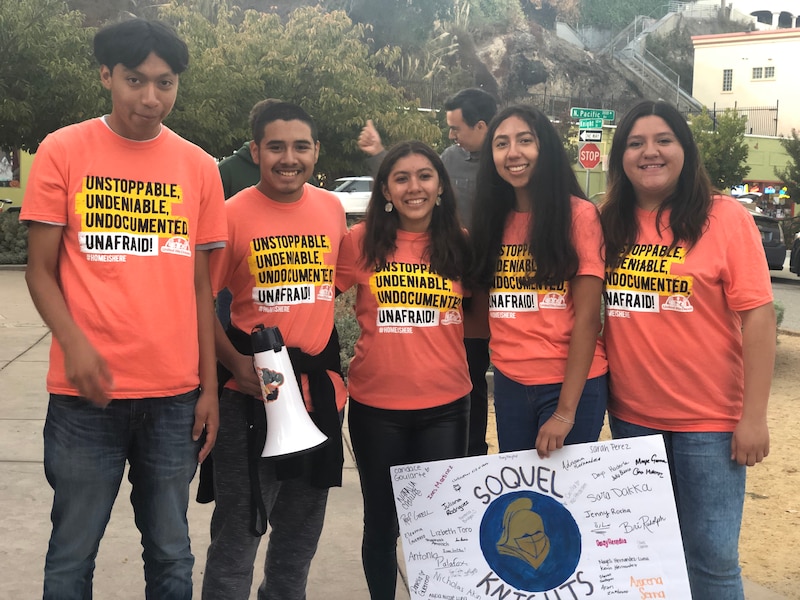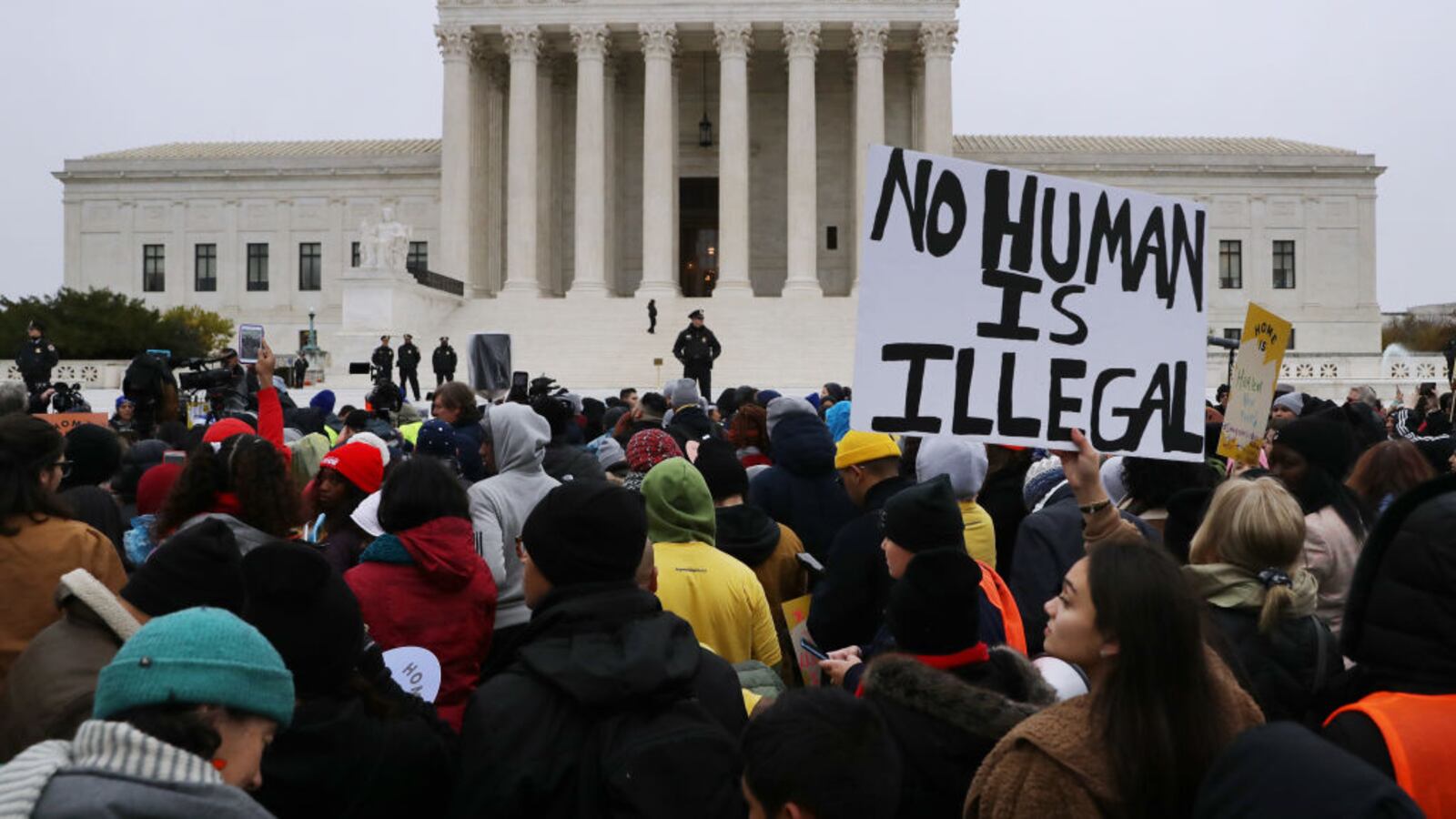The Supreme Court heard oral arguments today in three consolidated cases that will determine the fate of DACA, the program started by President Obama that granted work permits and protection from deportation to nearly 700,000 undocumented immigrants who were brought to the country as children.
The program has had an outsized impact on schools, as about four in 10 of its recipients were students in high school or college, according to a 2017 report from the Migration Policy Institute, a Washington, D.C. think tank. It’s also had tangible educational benefits: A 2018 study suggested that DACA made non-citizens, especially Hispanic students, more likely to graduate from high school and go to college.
The Trump administration announced it would end DACA in September 2017, arguing the program was illegal. Challenges to that decision have been winding their way through the courts ever since, and thousands of young people have been in limbo as the program stopped accepting new applicants. In court on Tuesday, a lawyer for the Trump administration argued that the program makes it harder to enforce immigration law and that it undermines “confidence in the rule of law itself.”
Inside the court, conservative justices indicated Tuesday they will side with the Trump administration and allow DACA to end, the New York Times reported, while justices on the liberal side raised questions about the administration’s rationale for ending it. A decision is expected by June.
Outside the court, and in cities across the country, DACA supporters rallied.
Seventeen-year-old Ricardo Chavez rode a bus to Austin, Texas to take part in one of those rallies today, missing two days of school. He also helped organize a walkout at his high school in Oklahoma City on Friday, which enrolls mostly Hispanic students.
“It’s definitely something that is affecting a large population of our students,” he said.
Many students at Chavez’s high school come from mixed-status families, he said, in which some members have legal status while others do not. Chavez himself is a U.S. citizen but his sister, a Head Start teacher, is a DACA recipient. His best friend also has DACA status, he said, and many of his friends are undocumented.
“It’s really hard for them to come out to things like this,” he said. Some couldn’t miss work or school, he added, and attending rallies can be emotionally difficult. “It’s important for me to show up for them in moments like these.”
Legal experts say there are three possible avenues the Supreme Court could take. The justices could affirm the lower courts’ rulings and allow DACA to continue — though many observers say this is unlikely. They could accept the Trump administration’s rationale for ending DACA, while leaving it open for a future president to revive the program, as several leading Democratic candidates for president have said they would. Lastly, the justices could rule that DACA was illegal, making it impossible for a future administration to restart a similar program.
A Supreme Court decision wouldn’t change the laws and policies in some two dozen states that grant in-state tuition to undocumented students. But DACA recipients aren’t eligible for federal financial aid, which can make paying for college difficult regardless.
Evelyn Venegas Cuzco, a 25-year-old DACA recipient, said that was the case for her. It took her five years to graduate from the University of Illinois at Chicago as she worked three jobs at the same time, plus a scholarship, to cover tuition.
“This is very much about my life,” said Venegas Cuzco, who marched for 18 days from New York City to Washington D.C., alongside two of the plaintiffs in the case, to attend the demonstration. “I have to be there in order for them to really understand how policies and the things that they do — Congressmen, policymakers, legislators — have effects on real lives.”
Several school districts and K-12 organization say DACA matters for them, too. The Migration Policy Institute estimates that some 9,000 DACA recipients work as teachers and teaching assistants.
Many education groups filed friend-of-the-court briefs arguing the DACA program should continue, including the National Education Association, the nation’s largest teachers union, as well as Teach For America, dozens of colleges, and national associations representing superintendents, school boards, principals, and school counselors.
“Without DACA renewals, the status of thousands of educators will expire on different dates throughout the school year,” lawyers for the National Education Association and the National PTA argued. “Teachers and staff will abruptly disappear from classrooms to the distress of their students and to the measurable detriment of educational outcomes.”
The lawyers also pointed to evidence that the Trump administration’s decision to end DACA had already harmed students. They said it had “created an atmosphere of anxiety that makes it more difficult for students to focus on their studies” and “caused many students to abandon their academic and professional goals.”
Seventeen-year-old Ines Adriana Martinez, a senior at Soquel High School just outside Santa Cruz, California, was planning to apply for DACA just as the Trump administration rescinded the program. She’s hoping the Supreme Court will reinstate it so she can one day apply. Having DACA, she said, would give her a sense of security in her community that she doesn’t have now.

For now, Martinez is filling out applications for colleges in California. She’s also looking at scholarships, though she’s found she is often ineligible for the ones her teacher has recommended, because of her immigration status. So she’s done her own research and talked with advocates at United We Dream, a youth-led Washington, D.C.-based organization that advocates for immigrant rights.
On Friday, she helped organize a walkout and rally at her school where she publicly told friends and teachers for the first time that she is undocumented.
“I hope that people understand that even if the Supreme Court decides to rescind DACA, that this is just the beginning, and that our home is here, and that we belong here,” she said. “All it is, as of right now, is just the wait. I hope that everything turns out OK.”
Education Secretary Betsy DeVos isn’t expected to discuss the case Tuesday. But in the past, DeVos offered limited support for DACA recipients, saying that her “heart is with them” but that it is up to Congress to enact new immigration laws.
“I understand they’re here not by their own volition, and yet they are serious about pursuing their education and contributing to our American society and culture,” she said back in September 2017. “We are a nation of compassion, and we are also a nation of laws.”
President Trump said on Twitter on Tuesday that he was open to reaching a “deal” with House Democrats that would permit DACA recipients to stay in the country, though he didn’t offer specifics. He also accused some DACA recipients of being “tough, hardened criminals,” despite the fact that to be eligible for the program, an applicant must show that they have committed no serious crimes.


